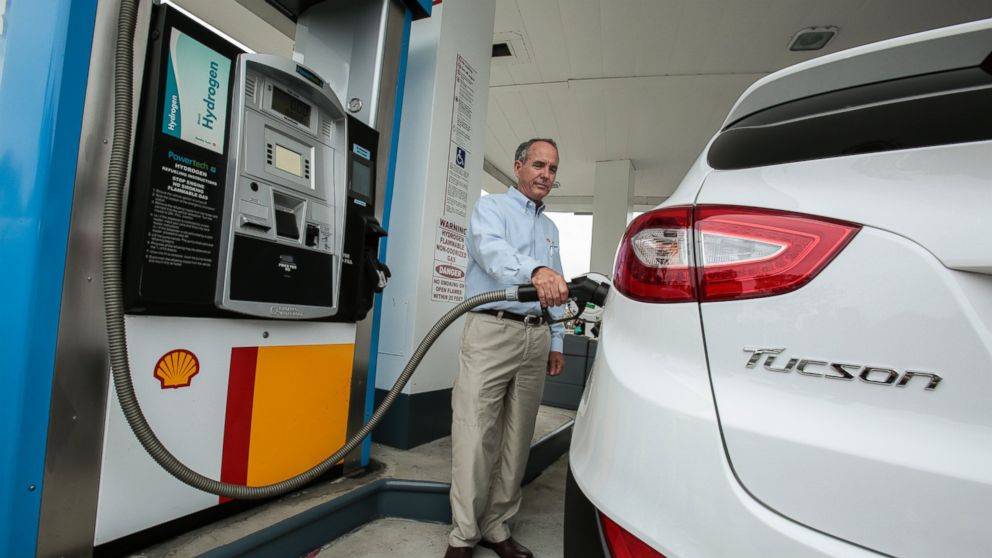Are Hydrogen Cars a Threat to Electric Cars?
If you build it, will they come? California invests in electric and hydrogen.

— -- California's $46.6 million bet on hydrogen fuel cell electric vehicles is testing the theory, "if you build it, they will come."
Automakers are only just starting to bring fuel cell cars to the market and most are beta test cars, according to Chris White, communications director for the California Fuel Cell Partnership in Sacramento. There are about 300 fuel cell cars and buses on the road in the state today, according to that organization.
Teresa Schilling, a spokeswoman for the California Energy Commission, explained that as part of Gov. Jerry Brown's goal of putting 1.5 million zero-emission cars on the road by 2025, the state needs to have in place the appropriate fueling and charging infrastructure. That's why three weeks ago, the commission approved more than $50 million in construction projects for these stations: $46.6 million in grants for 28 hydrogen refueling stations and one mobile refueler; plus $5 million for 175 electric vehicle charger stations.
"The goal is to invest early on and encourage auto makers to produce the vehicles," Schilling told ABC News. "They knew that if the infrastructure is there, consumers will buy it, which spurs private investment in refueling stations."
To date, the commission's program has allocated over $38 million in grants for the installation and construction of over 8,600 electric chargers in California. This includes over 3,900 commercially accessible chargers, over 3,800 residential chargers, and 756 workplace chargers, Schilling said.
"Electric cars and a charging infrastructure is just as important as hydrogen to getting to 1.5 million vehicles, which of course is to achieve California’s greenhouse gas reduction goals," she said.
What Elon Musk Says Could Be More Dangerous Than Nuclear Weapons
In Photos: The Coolest, Most Expensive, or Rare Cars
Derek Joyce, a spokesman for Hyundai, applauds the investment. Hyundai is one of the handful of car makers introducing hydrogen-powered cars. Last November, Hyundai announced leasing plans for its Tucson Fuel Cell vehicle for $499 a month for a 36-month term and $2,999 down. And, the deal comes with unlimited free fuel. The car became available this spring at several Southern California Hyundai dealers. The lease price includes maintenance, because Joyce said the technology is too new for mechanics on the street just yet.
Hyundai boasts of the longer range of hydrogen cars (265 miles vs. 100 miles for mainstream, or cheaper, electric cars) and the quicker refueling time. Joyce said the refueling process is very similar to that of a gas car: 5-10 minutes vs. several hours or more for an electric car, he said. Plus, there's an "infinite" supply of hydrogen, Joyce adds.
"There's a reason why Hyundai, Honda, Toyota and Mercedes Benz are investing in hydrogen vehicles," Joyce said. "There's tremendous potential for the future. But with any alternative fuel, there's the chicken and egg question."
That is, consumers might be wary of not being able to power their cars. It's a fear that the electric car market is overcoming with public support like that of the $50 million California investment.
In comparison to the small number of hydrogen cars on the road, the number of electric vehicles in the state, not including hybrid cars, are expected to cross the 100,000 threshold this quarter, according to the Center for Sustainable Energy. That's compared to 30,000 on Jan. 1, 2013. In the entire country, the number of electric vehicles on the road now is about 240,000, compared to 70,000 in January of last year.
Karl Brauer, senior analyst at Kelley Blue Book, said hydrogen fuel cells are much more expensive and less viable than pure electric cars right now, and they will remain that way for the "foreseeable future."




